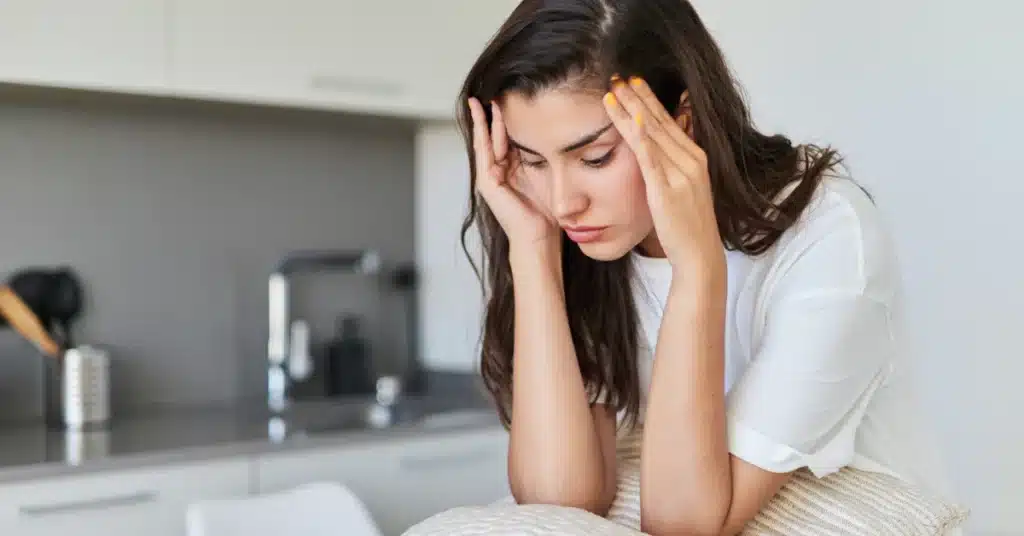Navigating the Complex Relationship Between Birth Control and Anxiety
For many women, birth control is a crucial aspect of reproductive health, providing a sense of control over family planning.
However, birth control can lead to many mental health problems, including anxiety. The hormonal levels may influence anxiety levels.
According to NCBI, people who use hormonal contraceptives experience more anxiety than individuals who don’t.
In this article, we delve into the nuances of this relationship, examining both the concerns and the reassuring findings.
Birth control pills and anxiety
Hormonal birth control, such as contraceptive pills, has been suggested to impact mood due to its influence on hormones.
Estrogen affects how our brain handles emotions and thinking, especially in areas like the amygdala and prefrontal cortex.
Birth control-related changes in Estrogen levels can mess with this regulation, possibly causing mood swings and anxiety.
Progesterone disrupts brain chemicals, making us feel more anxious. It boosts a chemical called GABA, leading to anxiety and messing with serotonin.
A review in 2011 found that up to 4 in 10 contraceptive pill users may experience mood disorder symptoms or emotional adverse effects, including anxiety.
Some women report an increase in depression and anxiety levels during the use of birth control, sparking concern about its potential role in exacerbating mental health issues.
IUDs and anxiety

The discussion extends beyond oral contraceptives to Intrauterine devices (IUDs).
Limited studies suggest a possible association between IUDs, particularly those containing
Levonorgestrel, and anxiety.
A case study documented escalated depression and panic attacks in a woman after IUD placement, with improvement upon removal.
A 2018 comparative study also identified a statistically significant association between Levonorgestrel IUDs and anxiety.
Conflicting research
While some studies point to a potential link between hormonal contraception and mood disorders, it’s crucial to consider conflicting evidence.
Numerous studies in recent decades have found that hormonal contraception, when measured against placebos, does not significantly affect mood.
Moreover, challenges in study design, lack of standardization, and varying measurement methods contribute to the complexity of interpreting research findings.
Potential factors beyond hormones

Studies suggested that besides hormones causing mental health problems, it might also be how people feel about using birth control in general.
This idea leads to questioning whether using birth control could somehow be tough on a person’s emotional well-being.
While anxiety and other emotions are linked to IUDs and birth control pills, it’s not just about the hormones.
The psychological effect of using birth control might be a big part of why some folks experience anxiety.
Addressing anxiety
For individuals experiencing anxiety related to birth control, prevention or cure may not be straightforward.
However, there are various approaches aimed at minimizing its impact on your mental health.
- Consider alternative birth control methods: If you suspect that your birth control is significantly impacting your anxiety, discuss alternative methods with your healthcare provider
- Lifestyle adjustments: Making certain lifestyle changes can complement your efforts to manage anxiety. These may include getting adequate sleep, regular exercise, maintaining a balanced diet, and limiting caffeine
- Seek mental health support: If anxiety becomes overwhelming, seek support from a mental health professional. Therapeutic approaches like Cognitive Behavioral Therapy can help cope with anxiety triggers and manage stress effectively
- Medication options: In some cases, medication such as antidepressants might be prescribed to help alleviate anxiety symptoms
Conclusion
The relationship between birth control and anxiety is a complex and multifaceted one.
Some studies suggest a link between hormonal birth control and mood disorders, other studies have conflicting evidence.
Anxiety associated with birth control might not solely be related to hormonal influences. It could also stem from psychological factors related to the use of contraceptives.
The birth control impact on mental health varies from person to person, and for those experiencing anxiety, addressing concerns involves a nuanced approach.
Exploring alternative birth control methods, lifestyle adjustments, seeking mental health support, and medication under professional guidance are potential avenues to manage anxiety.
Navigating the complexities of reproductive health and mental well-being requires open discussions with healthcare providers.
Frequently Asked Questions
WowRx uses only high-quality sources while writing our articles. Please read our content information policy to know more about how we keep our content reliable and trustworthy.






